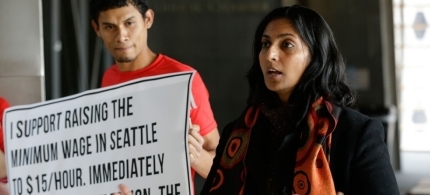
Sawant ran a grassroots campaign and said she ignored warnings that she had no chance of winning without corporate money or Democratic endorsement. (photo: Ted S. Warren/AP)
By Al Jazeera America
 eattle voters have elected a socialist to city council for the first time in modern history. Kshama Sawant, a member of the populist Occupy Seattle movement, ran on a platform of raising Washington State’s minimum wage to $15 and levying a “millionaire tax” to pay for mass transit and public education.
eattle voters have elected a socialist to city council for the first time in modern history. Kshama Sawant, a member of the populist Occupy Seattle movement, ran on a platform of raising Washington State’s minimum wage to $15 and levying a “millionaire tax” to pay for mass transit and public education.
Sawant took 50.3 percent of the vote to incumbent Richard Conlin’s 49.4 percent. Even in this liberal city, Sawant’s win has surprised many here because Conlin was backed by the city’s political establishment.
While city council races are technically non-partisan, Sawant made sure people knew she was running as a socialist – a label that would be politically poisonous in many parts of the country.
“In Seattle, living costs have become unaffordable for the vast majority of people working low wage jobs amid skyrocketing living costs,” Sawant told Al Jazeera. “This has created a hunger among people for a political alternative … and the beginning of an understanding that capitalism is not working.”
Sawant, a 41-year-old college economics professor, first drew attention as part of local Occupy Wall Street protests that included taking over a downtown park and a junior college campus in late 2011.
“I argued during this time that we should not just focus on the Occupy camp, but discuss the larger issues that brought people into the movement,” said Sawant. “We talked about the massive cost of education, the lack of funds for public education, and the failure of austerity politics.”
This year, though, she pushed a platform that resonated with the city. She backed efforts to raise the minimum wage to $15; called for rent control in the city where rental prices keep climbing; and supported a tax on millionaires to help fund a public transit system.
“We want to win $15 an hour to make life easier for Seattle residents, but we will be making a few things clear: This will not be easy,” said Sawant. “We will be going up against the might of corporations, big business and the super wealthy who will fight tooth and nail to prevent this from happening.”
“Even though we don’t believe in capitalism, we fight for reforms within the system because the experience of fighting for them raises the political consciousness of the working class and builds solidarity,” she added.
Sawant said that even if Seattle approves a new minimum wage, she believes that over the next few decades the real value of that wage will be “eroded.”
“We cannot replace capitalism without learning the lessons by fighting for reforms – you don’t learn how to fight to change a capitalist society to a socialist one in school. You learn from the real experience of the struggle,” Sawant told Al Jazeera.
Sawant said she hopes her victory opens the door to more socialist and leftist candidates in the future.
“Capitalism has been discredited … people on the left have to organize and consciously go for it.”
During her campaign, she condemned economic inequality, contending that some people aren’t benefiting from the city’s declining jobless rate and downtown building boom.
Sawant ran a grassroots campaign and said she ignored warnings that she had no chance of winning without accepting corporate money or teaming up with Democrats.
“We didn’t take a dime from big business,” Sawant told Al Jazeera. “We raised $120,000 through grassroots efforts alone, and we didn’t seek any endorsements from the Democratic Party.”
“It’s important that future campaigns run independent of Republicans, Democrats, and corporate cash to raise the possibility of creating a new party outside the two,” she added.
Last year, Sawant ran against state House Speaker Frank Chopp, a popular Seattle Democrat, but lost.
Her win for the at-large council position marks the first time a socialist will hold a city-wide post in roughly 100 years, according to the city’s archivist. Socialist Party candidates were elected to state and local offices before World War II, when the U.S. organized labor movement was strong nationwide.















